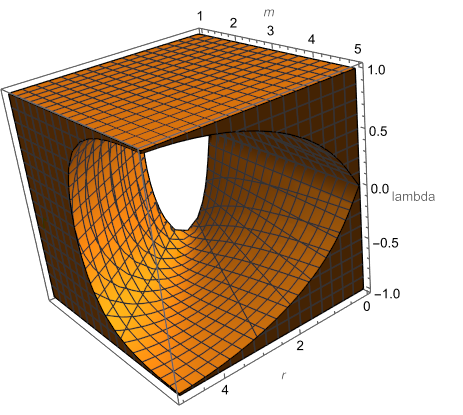I have a function which has one variable $r$ and two parameters $M,\lambda$. Whether or not the function has roots, depend on the parameters $M,\lambda$. I want to obtain a parameter space such that the function doesn't have roots. Naively, if the function is positive (or negative but this won't happen in this context) for all $r$ for a given set of parameters I know that there will be no roots. I want to check this condition for a range of parameter values, and therefore obtain a parameter plot. For example, if the function had been quadratic, I could simply check the determinant. But this is not a polynomial function, and has fractional powers in $r$. I am providing the functions here (the precision is set at 10 digits).
f[r_] := (r^2 (-1.000000000 + 2.000000000^(-1.000000000 Sqrt[1.000000000 + 0.3593734323 (1/m)^(2/3)]) (r/m)^Sqrt[1.000000000 + 0.3593734323 (1/m)^(2/3)]) (-1.000000000 (-1.000000000 + Sqrt[1.000000000 + 0.3593734323 (1/m)^(2/3)])^2 + 2.000000000^(-1.000000000 Sqrt[1.000000000 + 0.3593734323 (1/m)^(2/3)]) (1.000000000 + Sqrt[1.000000000 + 0.3593734323 (1/m)^(2/3)])^2 (r/m)^Sqrt[1.000000000 + 0.3593734323 (1/m)^(2/3)]))/(-1.000000000 + Sqrt[1.000000000 + 0.3593734323 (1/m)^(2/3)] + 2.000000000^(-1.000000000 Sqrt[1.000000000 + 0.3593734323 (1/m)^(2/3)]) (1.000000000 + Sqrt[1.000000000 + 0.3593734323 (1/m)^(2/3)]) (r/m)^Sqrt[1.000000000 + 0.3593734323 (1/m)^(2/3)])^2 + m^2 \[Lambda]^2
Physically, the $0 < \lambda < 1$ and $M > 1$. Ideally, I would like a RegionPlot to obtain the parameter space. I am just not sure how to operationally impose the condition that the function is always positive. So far, I tried
Reduce[ForAll[r,f[r] > 0],r]
but this doesn't give me anything useful. In fact, if the plot is obtained, I would not need an analytical expression for the condition.

